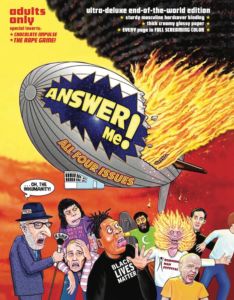Why I Never Gave Up on Women
As a man who was born with ample cognitive aptitude but almost zero wisdom, it’s taken me several decades to realize what in life is worth fighting for, what’s worth getting upset about, what I truly need, and what only gets in the way of my needs.
My dad drank a full bottle of hard liquor every day until he went sober at age 58 and died of colon cancer less than a year later. He was violent, and it imprinted violence on my soul, but I would have taken the beatings over his drinking because it was clear he loved alcohol more than he loved me, and it robbed me of a father and a proper childhood. My father stopped hitting me when I was around age 16 and decked him with one punch, which taught me the ugly lesson that sometimes people only stop hitting you when you hit them back. I swore I’d never become the nasty drunk that he was.
Audio version: To listen in a player, use the one below or click here. To download the mp3, right-click here and choose “save link as” or “save target as.”
I started drinking around age 18 and quit before I was 21 because there were too many blackouts, too many fights I never remembered, and too many encounters with police. I’ve never had a sip of alcohol since, and my unique fortune is that I’ve never been remotely tempted. I knew it was bad for me, that I was unable to handle it, and that if I even tried to drink moderately, it’d be Lost Weekend all over again. So giving up alcohol wasn’t some titanic triumph of the will for me. It was the easiest thing I’ve ever done.
My mom was a cold-wombed sadist, my sister was a vindictive and manipulative cunt, nearly every nun who ever taught me from grades 1-12 was a nasty moralist, and my first girlfriend hit me several times before I decided to hit her back.
My first wife was never violent toward me, although over the years it became clear to me (and a few discerning friends) that she was indifferent to my happiness because she was hyper-focused on her own misery, so I gradually became violent toward her before switching my modus operandi toward infidelity and abandonment. Just as I would have taken my dad’s bloody beatings over his alcoholic indifference, I would have gladly traded the handful of times I slapped my first wife for the dozen years she’d spent brutalizing me with her aimlessly incurable self-pity.
The mistress for whom I abandoned my first wife under intensely cruel conditions for which I will never forgive myself was easily the most malicious and violent person I’ve ever known. I realize how self-exculpatory that sounds coming from the man who went to prison for beating that mistress during a 10-minute car ride and leaving her dazed and bloody on a secluded mountain road, but the centerpiece of a 2002 autobiographical work I wrote while in prison lays the yearlong groundwork of violence, drama, and death threats that led to that ten-minute explosion of bloody rage, and many people who know the full story can only marvel at how I held my temper for so long.

You can buy Jim Goad’s ANSWER Me! here.
But the main thing that puzzled them was why I didn’t leave her far earlier — or even got involved with her in the first place.
I lost a good chunk of my life and my career over an ex-wife, who’d lied to the police (she later admitted she’d lied in an interview with a national magazine because she was angry I’d cheated on her), and a mistress who’d told provable lies about the circumstances surrounding that fateful night — not enough lies to discount the fact that I’d actually hauled off and walloped her, but she left out the part about bloodying my nose to start it all, which was the third time she’d hit me that day. The prosecutors didn’t seem to care about the fact that the DNA test found my blood on her jacket and my mug shot showed she’d clawed at my face. You see, we live in a “patriarchy” — a very strange one where it’s hardly ever considered a crime when a woman hits a man.
During my 29 months behind bars I frothed and foamed and railed about how society blindly advantages men over women. I still believe that. Even a quarter-century later, I haven’t stopped writing about it. But about two years into my stint, they moved me from a maximum-security prison to a coed facility in the industrial wastelands near Portland International Airport. Male and female convicts slept in separate dorms, but we ate in the chow hall together and walked the yard together. The moment I was around female hormones, I felt instant relief. Then, after only a few days — maybe someone checked my record and felt they’d made a mistake placing me around all those women — they rolled me back up and returned me to the all-male penitentiary, and I was back wallowing among male hormones and male urine and the stench of male armpits. The relief was gone.
After my release, I was skittish about ever talking to a woman again.
But less than two weeks after I walked out of the pen, I decided I couldn’t take the loneliness anymore. Mind you, I’ve never felt lonely when deprived of male companionship, but if I don’t have a woman in my life I’m involved with on some physical or romantic level, I’m baying at the moon. So I went to a local oldies bar, said “yes” when a woman asked me to slow-dance with her, and also said “yes” when she asked me if I wanted to go back to her house with her. As we held each other and began kissing, all that relief came flooding back. I was bathing in female hormones again.
She and I fooled around a few times over the ensuing weeks and parted amicably. But for nearly the next 20 years I kept making stupid mistakes with women I knew wouldn’t be good for me. Things never got too dangerous with the one-night stands and casual hookups, but once the word “love” entered the picture, I again endured violence, threats, and even more false criminal accusations — much of which I documented in this book. But by that point I’d at least wised up so that I knew to document everything, so I luckily escaped more jail time.
But why did I find it so easy to give up alcohol after spending only a night in jail, whereas I continued being stupid with women even though it had sent me to prison, effectively ended any hope of a mainstream writing career, and continued to agonize me?
Because I don’t need alcohol.
One night about five years ago after yet another scorched-Earth ending to another volatile romance, I invited a female friend and occasional lover to visit me. She showed tremendous patience and empathy as I told her one story after the next about diving into doomed relationships with damaged women and how everyone except me, the natural-born emotional idiot, could have predicted they’d all end disastrously. But in the hours-long course of laying out one sad saga after the next, rather than taking my usual route — which was blaming all those dirty bitches, even though they were plenty guilty — I felt shame. I felt like an alcoholic. And with that, the spell was broken. Giving up women I knew would be bad for me was as easy as giving up booze.
But I still knew I needed something from women — and not merely sex, you gutter-brained ruffian — so I still pursued them. And when I say “women” in the plural, I’m referencing the collective form of “woman,” the archetype. If I could find everything I needed in one woman, I wouldn’t need any more women.
I’m wired so that fame, money, and social approval aren’t nearly as important to me as they seem to be to others. But there’s something ingrained in my DNA about needing a deep emotional connection with a woman, something I couldn’t change if I wanted to. Just like that corny love song says, I need it like the air that I breathe.
April will mark five years since a pretty little sparrow landed on my windowsill. That’s her in the picture above. Unlike all her predecessors, she’s not malicious, indifferent, deceptive, or infantile. It’s almost as if, by swearing off bad women as if they were all bottles of Scotch cranked out by the same rotgut distillery, I’d magically conjured a good one from the ether.
We fell very quickly, but it wasn’t like falling into an abyss as it had been before. At first we were pinching ourselves — it couldn’t possibly be this good, right? Something has to go wrong. It always did before. But over the weeks, then months, and now years, the initial anxiety has given way to a sense of overwhelming calm. It’s never been about power, we never argue, we’re never mean to each other, and not only can’t we imagine living without one another, we wouldn’t want to.
I never gave up on women until I found the right woman. You can have the rest.





